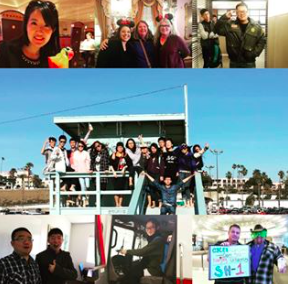Calaveras Enterprise (August 13, 2013)
East met West in Calaveras County and the results were enlightening. “My dream is that earth will become like a big village and all the people will make good friends in peace without any limitation,” said 26-year-old Maxine, a college student visiting from Hunan Agricultural University in China. Maxine, 10 other university students and their adviser, Kevin Liu, are in the midst of a two-week cultural exchange sponsored by Educational Resource Development Trust enVision. The students, ranging in age from 19 to 26, are staying with host families in Murphys and Angels Camp. Their goal is to learn about American institutions – education, health and safety, government, volunteerism and family life – and to compare them with ways of life in China.
“China is open to all the world and is friendly to the world,” Maxine said. “Their development is amazing. China welcomes foreigners, especially those who can teach English because cross-cultural exchange between people is important.”
The group will present a Chinese cultural event tonight at 6 p.m. at the Congregational Church in Murphys, and the public is invited to meet the students and learn a bit about their experiences.
The coordinating organization’s Executive Director Colin Churchill said the students are from families who have attained a comfortable standard of living with a high emphasis on education. Over his 30 years of involvement with China, Churchill said he has noticed an economic change in the country that has created a new middle class.
“I was in China in 1980 as a teacher for three months and everything was absolutely basic,” Churchill said. “Two years ago, my first time back, it’s completely changed. They have undergone more economic development in the history of the planet in 30 years.”
Churchill said poverty is still an issue in the countryside, with resulting social upheaval.
“They have this huge migration from the countryside to the city,” he said. “Poor people come to the cities to look for work. China was booming, so there has always been work. But now because of the worldwide recession, the economy in China is slowing down a little bit.”
He said that while there are forms of public assistance, citizens have to be registered in a certain place to receive it.
“You can’t really have that much freedom of movement,” he explained. “People who move from the countryside to the city, they cannot be officially registered in the city, so they’re kind of like an internal illegal immigrant. They’re not eligible for public assistance in any way.”
During a conversation with their host family, a group of the visiting students discussed the similarities and the differences between the peasant workers in China and the undocumented Mexican im-migrants in America.
Jocelyn, a 22-year-old student of labor and social security at the university, spoke about a government program so peasant workers can apply for jobs in the city, and when they are hired, they can go to live there. But the jobs are menial and there is little time or money for education so it is difficult for the new hires to advance. That – coupled with the lack of public assistance – makes their situation quite difficult.
Vickey, 21, said her grandparents have chosen to stay in the countryside.
“They like the simple life and do not enjoy the cities so much,” she said. “They grow their own food and enjoy the natural surroundings.”
When the group wasn’t busy sharing about ways of life, the students attended workshops and field trips Monday through Friday. They hiked at Big Trees State Park, attended a Music in the Parks concert in Murphys, toured the Sonora Regional Medical Center and the Ebbetts Pass Fire Station and helped to feed a horse in San Andreas. They practiced volunteerism at the Cajun Fete in Sheep Ranch, sang Karaoke at the Angels Mercantile, attended the New Christy Minstrels concert in Angels Camp, toured Cal Berkeley and Stanford University, went swimming at White Pines Lake and visited Yosemite.
The cultural exchange program has a total of about 400 students visiting California, with many more experiencing American life around the country. But the program’s emphasis is the high school program, which offers a cross-cultural semester for about 1,500 teens from 30 countries to study in the U.S.
“I really love the company’s vision of (fostering) world peace by helping people get to know each other on a one-to-one basis,” said the organization’s Regional Director Jody Roebuck, who has worked with the exchange program since the 1980s.
Roebuck and area coordinator Carli Shuman have worked to develop a network of Calaveras County families who open their homes to the students during the visit. The students are encouraged to take part in all family activities, including chores, and they have shown an eagerness to learn about the American way of life.
“I have loved the entire experience,” said one host mother. “The girls are so sweet and they call me Mom. I got a little scratch on my leg at Big Trees, and they wanted me to sit down and rest! They act like they want to take care of me, instead of letting me take care of them. We have become very close in this short time together.”
In addition to developing close relationships, the students adapted quickly. Already familiar with the American restaurants that are common in China such as McDonald’s, Round Table and Subway, the students also tried spaghetti and meatballs, peanut butter and jelly sandwiches and breakfast cereal. While the students said they eat oodles of noodles in their home diet, some tried fettuccini at a Sacramento Old Town restaurant and had stomachaches because of the cheese. Hamburgers and Jambalaya were among the favored meals.
But it wasn’t only the students who tried new foods. They introduced their hosts to Chinese foods by preparing a selection of customary meals, such as noodles flavored with hot spices and stir fry with chicken or beef and rice.
Keeping in mind cultural differences, those involved with the program see the unifying benefits of the exchange program.
“Meeting people from other cultures taught me that we all share the same goals in life,” Roebuck said. “That is, we all want health, happiness, strong family ties, education and financial comfort. We just achieve those things differently.”
Linda Field is an Enterprise community correspondent. Contact her at [email protected].




